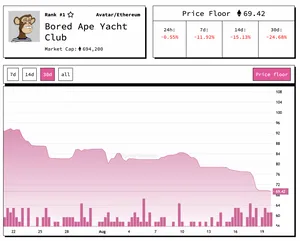At least one of the scammer wallets interacted with the Kraken crypto exchange, a U.S.-based exchange that requires KYC, so it's possible that Kraken could help identify the scammers — though they've not made any public moves to do so.
SudoRare NFT exchange rug pulls for $820,000
- "NFT Exchange SudoRare Goes Dark After $820,000 Rug Pull", CryptoBriefing
- "SudoRare Pulled the Rug for $820,000. How Will Kraken Respond?", CryptoBriefing
Bank run leaves BendDAO with 5 ETH and a bunch of NFTs they can't sell
BendDAO allows people to take out loans with their NFTs as collateral. However, if the floor price of those NFTs drops too far and the borrower doesn't pay back some of the loan to adjust its risk rating, other people can bid on the NFT.
The problem with this whole plan was revealed when lenders' confidence was shaken when it was reported that $5.3 million in Bored Apes were at risk of liquidation. Panicked users withdrew their assets from the platform, resulting in a bank run that drained the reserves to a low of 5 ETH (~$8,200). BendDAO had other assets, of course: the NFTs below the liquidation threshold. However, a lack of interested buyers willing to pay the minimum prices (95% of the collection floor price) left the project in a tough spot.
Since the extremely close brush with a liquidity crisis, the project has begun to consider a proposal that would reduce the threshold at which NFTs can be liquidated, reduce auction and liquidation protection periods, remove the 95% floor price bid requirement, and increase interest rates.
OpenSea's stale listing issue burns another collector
In this case, a person successfully sold their Pudgy Penguin NFT for 8.69 ETH a year ago ($27,500 at the time of sale). Those particular NFTs have been having a comeback lately, and so the collector bought the same NFT back — this time for 20 ETH ($31,500 at the time of sale). However, an old listing from their previous ownership was still active, and someone was able to snap up the NFT from them for only 9.89 ETH ($15,600) within minutes.
The collector's near-instantaneous $20,000 loss has a happy ending for them, though — the person who bought the NFT was willing to reverse the trade.
Someone buys a Bored Ape, gets scammed out of it two hours later
Sub-primate lending: $5.3 million in Bored Apes used as loan collateral are at risk of being liquidated
However, NFTs in general haven't been doing so hot lately, and the Bored Apes haven't been immune from the slump. As the Bored Apes collection floor price has decreased, more than 15% of the apes used as collateral for BendDAO loans are in the "danger zone" — close to being auctioned off. These 45 apes are valued at roughly $5.3 million. Liquidation could lead to cascading liquidations, as the auctions could themselves cause the floor price to decrease.
As Bennett Tomlin put it, "I hate that y'all somehow created a risk for cascading liquidations of JPEG backed loans".
DegenTown NFT project rug pulls after promotion from Magic Eden
DegenTown first suffered issues in July, when the project's Twitter account was allegedly hacked, and users were tricked into approving a contract that drained their wallets. One individual behind the project promised they would compensate the users whose wallets were drained, but never did.
The project ultimately rug pulled instead, with Magic Eden acknowledging it in a blog post and Twitter thread on August 17. They wrote that they were "urging the original Degen Town founders to return the funds" — however, this is complicated somewhat by the fact that the identity of one of them is not known to Magic Eden. They explained, "Our prior policy was that we doxxed founders. NFTRamo claimed to be an advisor but we learned that he was actually the founder of the project and used being an advisor as a way of skirting our doxxing processes." This is not the first time their identity verification process was sidestepped — they introduced it after a serial rugpuller used their platform to anonymously sell and then rug pull another NFT project, but that same person was able to do it again only a few months later.
The DegenTown project minted 8,000 NFTs for 3 SOL apiece, bringing in $923,000. Beyond that, the creators took 7.5% in royalties on secondary sales. Magic Eden has said that they were able to get one of the two founders to return the funds they'd earned from the mint, and that they planned to use them to compensate buyers.
- "Magic Eden Response to Degen Town", Magic Eden blog
- Twitter thread by Magic Eden
Claims of racist imagery in Bored Ape Yacht Club NFT project make it to court
Ripps is a part of a group of people who have vocally criticized the Bored Apes project for being racist and antisemitic, with what they believe are intentional hat-tips to 4chan culture. Ripps also created his own NFT project, called RR/BAYC, where he clones the Bored Ape NFTs and sells them in what he says is a "critique [of the] hateful imagery". Because Yuga Labs has never brought action against any of the many Bored Ape ripoff NFT collections, he and his lawyers are arguing this lawsuit is an attempt to silence his criticism.
Some of Ripps' and others' individual claims about dogwhistles in the project are more believable than others, but in their entirety they are pretty damning. Ripps is not the only one who has been outspoken about the issue, and is joined by people in and outside of the NFT world.
- "Court filing in Bored Apes lawsuit revives claims founders built NFT empire on Nazi ideology", Daily Dot
- Motion to dismiss
- "Bored Ape Yacht Club is Racist and Contains Nazi Dog Whistles", Ryder Ripps' website
- "BAYC (Bored Ape Yacht Club, the highest market cap NFT) is racist. All that remains to be answered is: why?", Fredrick Brennan
- "Yuga Labs—the author of the highest market cap NFT—is either racist or complicit in Kerem Atalay (one of its executives)’s indifference to racism.", Fredrick Brennan
Collector loses four Bored Apes valued at over $500,000 to phishing attack
ASEC_APE had just purchased the four NFTs between July 15 and August 13 for a combined total of 326 ETH (~$532,000 based on ETH prices at the time of each purchase; ~$631,000 at the price on the day of the theft).
One of the stolen NFTs, Bored Ape 9012, had just been stolen a week before from Cameo CEO Steven Galanis when his wallet was compromised, as were a handful of other pricey NFTs. ASEC_APE had purchased it from the person who purchased it from the hacker shortly after the August 6 theft.
Scammer trades fake ApeCoins for Bored Ape NFT
OpenSea changes its policy, requires a police report to freeze NFTs
Some have praised the change as a good step towards preventing false reports, whereas others have complained that the change does not apply retroactively to assets that have already been frozen from trading on the platform. Others have raised concerns about the new requirement that they engage with police.










